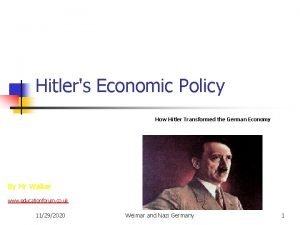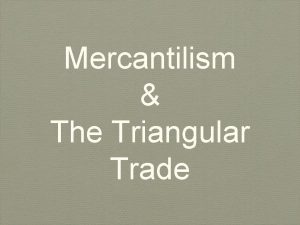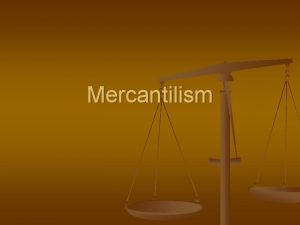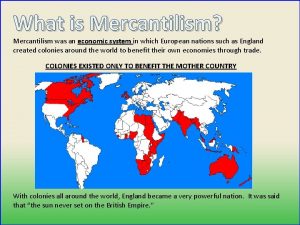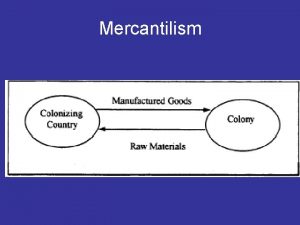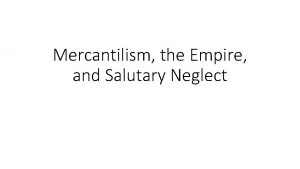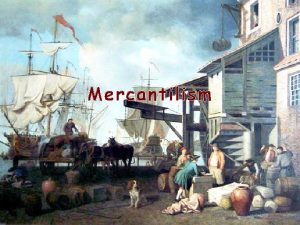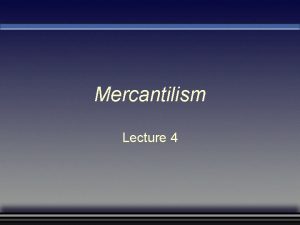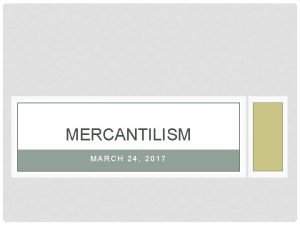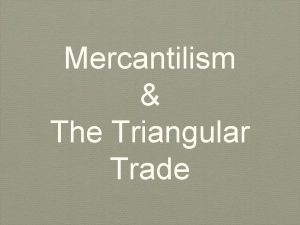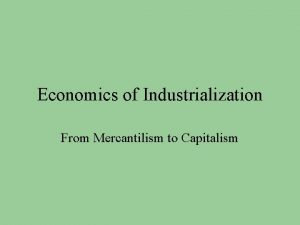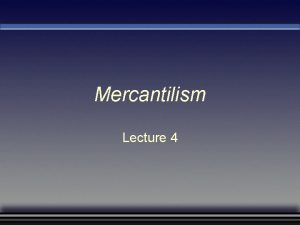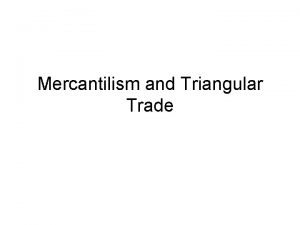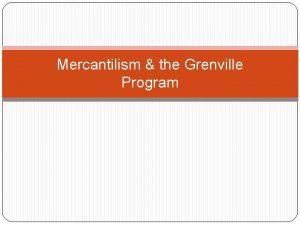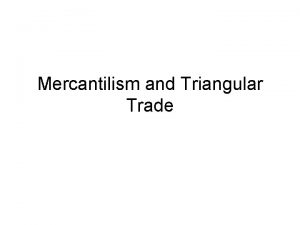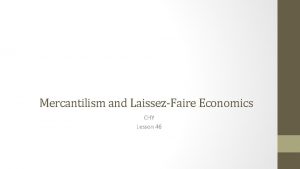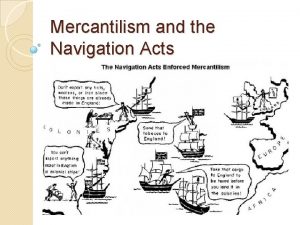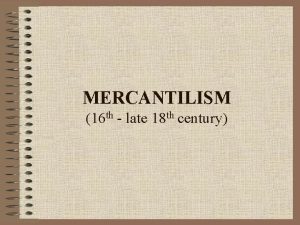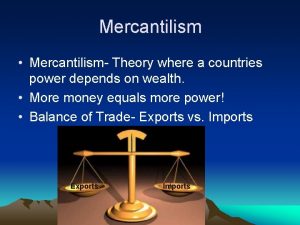Mercantilism Mercantilism was the dominant economic policy of






































- Slides: 38

Mercantilism �Mercantilism was the dominant economic policy of the 17 th and 18 th century. �Mercantilism dictated that exports must exceed imports, markets at ports should be monopolized, and colonies should not trade with foreign nations. �Britain’s plan was to pay off its debt by

Navigation Acts � This policy was instituted officially with the passage of the Navigation Acts in 1651, which restricted colonial trade solely with Britain, requiring all goods shipped to and from the colonies to be transported on British ships. * *Period of Salutary Neglect: Definition & Effects. Study. com

Navigation Acts � While the Navigation Acts became the backbone for this mercantilist policy, they proved difficult and costly to enforce. � Most colonial merchants found it easy to bypass these laws and rampant smuggling occurred. The colonies traded frequently with the French, the Spanish, and the Dutch. * *Period of Salutary Neglect: Definition &

Salutary Neglect � Not surprising, the illicit trade made New England merchants very wealthy, and much of that wealth was used to purchase tremendous amounts of British manufactured goods. � Britain's first Prime Minister, Sir Robert Walpole, assumed his position in 1721 and quickly realized that Britain was benefiting economically from this illegal trade. * *Period of Salutary Neglect:

Salutary Neglect � Salutary neglect was the unofficial British policy of lenient or lax enforcement of parliamentary laws regarding the American colonies during the 1600 s and 1700 s. � This policy was followed to keep colonial allegiance while allowing Britain to focus its attention on European policies. *Period of Salutary Neglect: Definition &

Paxton Boys � on December 14, 1763, when a group of armed men from Paxton, Pennsylvania, attached the Conestoga Native Americans, living on the small reserve of land. � A few weeks after the original attack, 50 or 60 armed men on horseback attacked the surviving Conestoga Ind ians who had been placed under protective custody in the jailhouse at Lancaster.

Paxton Boys � By early 1764 nearly 250 "Paxton Volunteers, " gathered and headed for Philadelphia intending to kill several hundred Indians under the protection of the Pennsylvania government. � Benjamin Franklin and a small militia force stopped the group before anything further happened. but a pamphlet war quickly ensued that explicated the grievances of the frontier inhabitants

Regulators �In 1764, several thousand people from North Carolina, mainly from the western region, were extremely dissatisfied with the wealthy North Carolina officials, whom they considered cruel, arbitrary, tyrannical and corrupt.

Regulators � Local inland agricultural community suffered from a deep economic depression because of severe droughts throughout the previous decade, thereby losing income. � As income was cut off, the local planters often fell into debt. The merchants, in turn, relied on lawyers and the court to settle disputes. � Regulators attacked lawyers and the courthouse

French and Indian War � In the mid-18 th century, both the British and French wanted to extend their control into the area west of the Appalachian Mountains, called the Ohio Territory. � Both already had fur traders doing business with Native Americans there and pioneers living on the frontier. � The French believed they had exclusive rights to the land since their explorers had been there first. � They tried to force the English out by capturing several of their trading posts and destroying an Indian village that supported English traders

French and Indian War � When the French built Fort Duquesne in 1754 near present-day Pittsburg, Britain let the colonists form a militia. � The Virginia militia, under the command of Major George Washington, was mobilized to ask the French to vacate the Ohio territory peaceably. � They refused, but Washington didn't have a large enough force to overpower Fort Duquesne. Source: French and Indian War Causes and

French and Indian War � Washington returned the following year with more men and proceeded to build his own stockade nearby, called Fort Necessity. � The French captured the new fort in 1756, and when word reached England, King George II declared war. � France and Britain would fight until 1763 Source: French and Indian War Causes and Effects, study. com

Treaty of Paris � The Treaty called for � France to give England all of Canada and the eastern half of Louisiana. � In exchange, France kept control of a few Caribbean sugar islands and two fishing islands along the Canadian coast. � Spain gained control of the western half of the Louisiana Territory. Spain also traded Florida in exchange for Cuba. The Mississippi River was left open to all of the nations. Source: French and Indian War Causes and Effects, study. com

Pontiac’s Rebellion � To complicate matters, the Ottawa tribe, under the leadership of Chief Pontiac, mounted a rebellion in 1763, against the British at Detroit. � This attack encouraged other tribes in the Great Lakes to also rebel, leading to a larger conflict known as Pontiac's Rebellion. � Even though the British put down this rebellion, King George III felt uneasy about the turbulent circumstance in this area. Source: Proclamation Line of 1763: Definition & Explanation, study. com

Proclamation Line � After the French and Indian War, settlers thought that they would have access to the Ohio River Valley. � However, King George III issued the Proclamation Line of 1763, which prevented this. � Britain already had a large debt following the French and Indian War and could not afford to take on more financial burdens, including protecting settlers on the frontier. � They also preferred having the colonists settled close to the coast to watch them. Source: Proclamation Line of 1763: Definition &

Proclamation Line � Thus, settlers were forbidden were prohibited from moving into the area to the west of the Appalachian Mountains. � Moreover, any settlers who already purchased lands from the natives in this area had to leave. � The British treasury had been drained by years of war that had taken place across the globe, but most potently in Europe and North America. Source: Proclamation Line of 1763: Definition & Explanation, study. com

Financial Problems � Britain needed to money to pay for the war, so they started to impose mercantilist policies on the colonies � Britain restricted the colonies to only using goods produced within the British Empire. � This was done through the passage of a series of laws that directly targeted the colonies, but did not ask for the

List of Economic Policies Put into Effect �Sugar Act (Apr 1764) �Currency Act (Sep 1764) �Stamp Act (Mar 1765) �Quartering Act (May 1765) �Declaratory Act (May 1766) �Townshend Act (June 1767) �Tea Act (May 1773)

Sugar Act � Seeking to make their taxation more effective and stamp out smuggling, Parliament passed the Sugar Act. � This law lowered the tax on molasses to 3 cents/gallon but also improved the process of tax collection. � In spite of the lower costs, the Act actually increased state revenue by collecting tax from sources that otherwise did not pay. � It also established a system of courts in Nova Scotia to prosecute smugglers -- the burden of proof rested on the

Currency Act �The Currency Act outlawed the use of colony specific currency in lieu of imposing a singular currency throughout the British Empire. In effect, this caused considerable deflation in many colonies whose currency became useless.

Stamp Act �The Stamp Act required that all legal documents, newspapers, playing cards, and other papers to have a government issued stamp, for which there was a charge. �This was the first new tax actually imposed on the colonies by parliament. It also required that taxes be paid in specie (gold and silver. )

Quartering Act � The Quartering Act attempted to cut upkeep costs facing the army by shifting the burden from the crown to the locals. � The law required colonies to provide housing for the soldiers in barracks, taverns, and vacant buildings as well as providing them with firewood, candles, beer, and other items.

Declaratory Act � Boycotts against British goods in the colonies successfully undermined business enough that Parliament was inclined to repeal the Stamp Act. � However, looking to save face in the wake of the Stamp Act’s defeat, Parliament passed the Declaratory Act. � The Declaratory Act stated Parliament’s right “to legislate for the

Townshend Acts � Named after the chancellor of the exchequer, Charles Townshend, the Townshend Acts were passed 1767. � Seeking a way to pay for imperial officers without relying on colonial assemblies, Townshend proposed a series of taxes on goods that were only produced in Britain, such as tea, papers, paint, lead, and glass. � A new customs headquarters was likewise established in Boston. This new institution also had expanded power to

Response to the Townshend Act � John Dickinson published his famous critique of British tax policy in the colonies, specifically aimed at the Townshend Acts, known as “Letters from a Farmer in Pennsylvania” in June 1767. � Dickinson argued that since the purpose of the tax was to pay the salaries of government officials, it should be the role of colonial government assemblies to raise the money needed and not a tax

Boston Massacre � One of the most noteworthy and sensationalized events of the break from Britain was the Boston Massacre. � Following months of rising tension between colonists and British officials, a mob gathered around a garrison of British troops, cursing at them, throwing snowballs, and rocks. � In response, the soldiers fired into the crowd, killing five men. Most of the soldiers were later put on trial and acquitted, being ably defended by John

Tea Act � On the same day of the Boston Massacre, Parliament voted to repeal the Townshend Act. � Parliament still insisted on retaining the right to tax the Americas in some fashion; thus in 1773 the Tea Act was passed. � The Tea Act established a monopoly over tea sales by the British East India Company, allowing them to cut the price of tea to the point were it was unprofitable to smuggle Dutch tea. � Furthermore, only 5 men in all

Sons of Liberty �Fearing that the Tea Act was just another way to get tax money from the colonists indirectly, many protested by avoiding to drink tea. � As the radical opposition group known as the Sons of Liberty grew in influence, it became increasingly common for tea ships to leave port before unloading their goods, due to pressure from the Sons. �Not wishing to concede to the Sons of Liberty, Boston

Boston Tea Party � The immediate response to Hutchinson’s decree ensuring the tea reached its destination was vandalism by the Sons of Liberty. � In the midst of the December cold, a band of men from the Sons of Liberty gathered together dressed as native Americans, boarded the tea ships at harbor and threw the tea being transported

Post-Townshend Acts, cont’d � Outraged, the British government passed the Coercive Acts, also known as the Intolerable Acts. The Coercive Acts included; �The Boston Port Act- Closed down Boston's port until the East India Company was paid for the tea lost. This punished all Bostonians for the crimes of a few. �The Massachusetts Government Act- Changed the Massachusetts government structure so that all of the elected officials were put in place by either the governor, parliament, or the king. This effectively eliminated any self determination within the colony. �The Administration of Justice Act- Allowed the governor to try royal officials outside of Massachusetts should they be accused of a crime there. �The Quartering Act- In order to more effectively house soldiers

Quebec Act �The 1774 Quebec Act dictated that the area of Quebec and the Ohio River Valley could rule in a traditional French style and foster the growth of Catholicism in their territory. �This angered colonist from New England the Central Colonies, since they had already begun settling the Ohio River

Grievances in NJ � It was a crime to cut down any white pine trees on lands not enclosed by fences � English men of money owned millions of acres of forests, and they were making profits from cutting down the white trees and using them for masts; � They didn’t want competition, so it was illegal to cut down any pine trees on unenclosed lands, as most of the lands in New Jersey were.

Grievances in NJ � England passed a law making it a crime for colonists to make any article of iron. � The law was passed in the interest of the iron manufacturers of England. � Nevertheless the mines at Charlotteburg and Ringwood continued to be worked; the iron was taken by wagon through Paterson to the river at Passaic where it was loaded on vessels and taken to England.

Continental Congress � The first meeting of the Continental Congress occurred in 1774, with it being comprised of 55 delegates from the thirteen colonies. � The Congress aimed to establish self determination within the colonies, though only some of the more radical members actively sought confrontation (and eventually succession) from Britain.

Lexington and Concord � Having gained information that rebel munitions were being stored by the militia at Concord, British soldiers were dispatched to confiscate them. � En route, they were confronted by local militiamen. When the British ordered the militia soldiers to break formation, confusion in the ranks broke out and a shot was fired (source conflict whether an American or British soldier fired first. ) � This “shot heard around the world” turned out to be the first in a prolonged

Lexington and Concord � The battles of Lexington and Concord were the first of the American Revolution. � The militia forces retreated from the superior British forces initially. However, as the British continued on their way to Concord, they were regularly harassed by ad hoc bands of militia “minutemen” who showed up along the edges of the road and fired on the British troops. � The British mission was ultimately a failure, with them suffering relatively heavy casualties and being unable to procure the Concord munitions since they were

Second Continental Congress � The Second Continental Congress added Benjamin Franklin, Thomas Jefferson, and John Hancock to a roster of delegates which already contained John Adams, Samuel Adams, Patrick Henry, and George Washington from the First Continental Congress. � Reacting to the growing mass of militia men surrounding the British encircled at Boston, the Congress eventually adopted the militiamen as the Continental Army and on July 8 th 1775 declared the need for the colonists to take up arms against Britain. � The also elected George

Common Sense � In January, 1776, Thomas Paine published “Common Sense. ” � This seething critique of the British monarchy argued that there could be no reconciliation between the colonies and the crown, with independence being the only option. � Paine likewise went to great lengths to strip the monarchy of its traditional justifications for power, claiming they had no right to rule since only the people could decide where power comes from. � July 4 th, 1776 the Congress passes a declaration of secession from the British government: the Declaration
 Local economy examples
Local economy examples Economic policy
Economic policy New economic policy
New economic policy Laissez faire economic policy
Laissez faire economic policy Hitlers economic policy
Hitlers economic policy Chapter 1 lesson 2 our economic choices worksheet answers
Chapter 1 lesson 2 our economic choices worksheet answers Economic growth vs economic development
Economic growth vs economic development Economic growth and development
Economic growth and development Thế nào là mạng điện lắp đặt kiểu nổi
Thế nào là mạng điện lắp đặt kiểu nổi Dạng đột biến một nhiễm là
Dạng đột biến một nhiễm là Thế nào là sự mỏi cơ
Thế nào là sự mỏi cơ Bổ thể
Bổ thể Vẽ hình chiếu đứng bằng cạnh của vật thể
Vẽ hình chiếu đứng bằng cạnh của vật thể Phản ứng thế ankan
Phản ứng thế ankan Môn thể thao bắt đầu bằng từ chạy
Môn thể thao bắt đầu bằng từ chạy Thiếu nhi thế giới liên hoan
Thiếu nhi thế giới liên hoan Khi nào hổ con có thể sống độc lập
Khi nào hổ con có thể sống độc lập điện thế nghỉ
điện thế nghỉ Hát lên người ơi
Hát lên người ơi Một số thể thơ truyền thống
Một số thể thơ truyền thống Trời xanh đây là của chúng ta thể thơ
Trời xanh đây là của chúng ta thể thơ Bảng số nguyên tố lớn hơn 1000
Bảng số nguyên tố lớn hơn 1000 Tỉ lệ cơ thể trẻ em
Tỉ lệ cơ thể trẻ em Tia chieu sa te
Tia chieu sa te Các châu lục và đại dương trên thế giới
Các châu lục và đại dương trên thế giới Thế nào là hệ số cao nhất
Thế nào là hệ số cao nhất ưu thế lai là gì
ưu thế lai là gì Sơ đồ cơ thể người
Sơ đồ cơ thể người Tư thế ngồi viết
Tư thế ngồi viết Hát kết hợp bộ gõ cơ thể
Hát kết hợp bộ gõ cơ thể đặc điểm cơ thể của người tối cổ
đặc điểm cơ thể của người tối cổ Cái miệng nó xinh thế chỉ nói điều hay thôi
Cái miệng nó xinh thế chỉ nói điều hay thôi Mật thư anh em như thể tay chân
Mật thư anh em như thể tay chân Tư thế ngồi viết
Tư thế ngồi viết Chó sói
Chó sói Thẻ vin
Thẻ vin Thơ thất ngôn tứ tuyệt đường luật
Thơ thất ngôn tứ tuyệt đường luật Các châu lục và đại dương trên thế giới
Các châu lục và đại dương trên thế giới Từ ngữ thể hiện lòng nhân hậu
Từ ngữ thể hiện lòng nhân hậu




